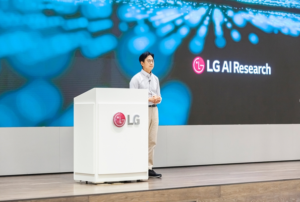LG AI Research Adds Another $89M Investment To Its Super-Giant AI Dreams

In December of 2020, consumer electronics giant LG quietly launched an LG AI Research division in South Korea to develop new kinds of AI technologies that can bring increased value and intriguing services to consumer and business customers around the world. LG AI Research was created with $180 million (200 billion Korean won) in funding over three years for research and development and staff to take on the initiative.
Now, to further drive that mission, LG AI Research has announced the investment of another $89 million (100 billion Korean won) for what it is calling “super-giant AI,” a large-scale computing infrastructure that resembles human brain structure, according to a recent blog post from the company.
The expanded plans were unveiled by Dr. Kyunghoon Bae, the head of the nascent research division, in a presentation earlier this month at an LG event.
The idea behind super-giant AI is that it is being developed to resemble a human brain structure that comprehensively and autonomously thinks, learns, judges and acts in any given situation by learning from huge amounts of data, according to the post. To make it happen, LG AI Research is using the additional funding to build large-scale computing infrastructure capable of generating 9,570 trillion calculations per second, resulting in the generation of some 600 billion parameters for the super-giant AI work. It is expected to be ready by the second half of 2020. With the capability of evaluating 600 billion parameters, this would make it more than three times as powerful as the 175 billion parameters used by the GPT-3 language generator.
LG’s plans do have an air of grandiosity to them.
“LG AI Research plans to design AI that is greater than the upper one percent of human experts and develop AI that has expert-level intelligence in various fields at the same time, based on the new possibility powered by super-giant AI,” the company states in its blog post. “For example, the plan is to offer a learning experience for practical communication with various people and numerous educational courses to create AI that is capable of communicating at a level on par with communication experts trained for decades. Once LG AI developed in this manner is applied to customer consultation chatbots and callbots, we will be able to analyze customer sentiment revealed in sentences and conversations to provide natural and satisfying services.”
As a result, LG AI Research “plans to offer customer consultations that match the finest professional counselors in customer service centers, while developing AI that is capable of even signing contracts with B2B customers.”

Dr. Kyunghoon Bae, the head of the LG AI Research division, announcing the new super-giant AI funding at an event earlier in May. Image courtesy of LG AI Research.
Also in the pipeline are “meta-human technologies that gave shape to AI to create a deeper consensus with our customers to deal with any issues faced by them faster and more accurately,” according to LG. “Against this backdrop, we will be able to communicate with our customers and share our joy in the upcoming Metaverse world.”
This new generation of AI uses the company hopes to develop is being seen by LG AI Research as communicating with people while also bridging the gap between people and machines. “AI will understand the human language and translate it into a programming language interpretable by machines to rapidly deliver more valuable products and services to customers,” the blog states.
One place where this could be used is to bring order to some 250 years of chemistry research which has never been digitized, according to the company. Without being available in digital form, it is unavailable for use by AI to help further chemical science and new research.
To correct this huge gap, LG AI Research plans to use its super-giant AI to analyze those paper-based academic papers and patents and construct a database that can be used with AI to make new connections and discoveries that are not possible today. “It will not only recognize molecular structures in the papers and abstract physical information from tables but also extract various experimental conditions from the main text to build a comprehensive substance database.”
Once completed, this will open possibilities for AI-based discoveries of new substances that could lead to advancements in high-capacity, long-life batteries for electric vehicles and other innovations such as eco-friendly plastic materials.
Healthcare is also a field where LG AI Research sees possibilities, including research into the development of customized anti-cancer vaccinations and drugs without any side effects, the company says. “LG AI Research will develop new substances/materials with LG affiliates through super-giant AI research and offer a more convenient and enjoyable life to humankind.”
LG AI Research is the dedicated AI organization for the parent company, LG Group, which is based in South Korea, a company spokesman told EnterpriseAI. “It is in charge of securing the latest AI source technology and solving AI challenges for affiliates,” the spokesman said. “It also conducts research in cooperation with affiliates such as LG Electronics and LG Chemistry.”
The company also has a wide range of data and plans for the use of AI in enterprises and in the materials field, the spokesman said.
But while LG’s plans sound interesting, the latest $89 million in funding does not sound big enough to make all these lofty goals happen anytime soon, Dan Olds, the chief research officer at Intersect360 Research, told EnterpriseAI.
“While this might seem like a large investment, I’m not sure how far it’s going to take them down the road to what they call super-giant AI which will surpass everything that has been done to date,” said Olds. “This $89 million isn’t even going to make a dent into the types of problems that they claim they’re going to solve. They’re going to have to bring more money to this poker game and, at the same time, lower their ambitions to things that are more reasonable.”
Olds said that there is a lot of research going on in AI today, but that many companies are keeping a lid on it as they see this type of advanced AI as a competition advantage to use against their rivals.
“It’s interesting to note that their ambitions run far beyond consumer products,” he said of LG. “Their blog discussing this new initiative mentions everything from chatbots to self-driving cars to contract negotiation to curing cancer. LG is a huge conglomerate which obviously has many lines of business besides their consumer products. It looks like they intend to use their somewhat modest first investment in AI to fuel a large amount of research in several unrelated areas.”
When it come to AI investments nowadays, it's not cheap to jump into the fray. While the almost $270 million AI investment by LG AI Research is not small, it certainly isn't as large as the $1 billion Microsoft invested two years ago in OpenAI, the independent AI research and deployment company that created GPT-3 and its predecessors. GPT-3 is a massive natural language model that runs exclusively on Microsoft Azure. Microsoft's investment in GPT-3 is already paying dividends after Microsoft announced on May 25 that it is integrating the language generator into its Microsoft Power Apps software to make it easier for enterprise workers to build no-code applications.












